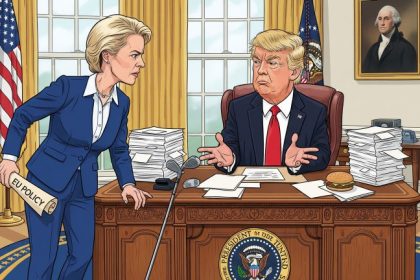In a statement that has sent diplomatic ripples through Washington, Beijing, and Taipei, President Donald Trump claimed that Chinese President Xi Jinping gave him a personal assurance that China would not invade Taiwan during his presidency. The remarks, made during a recent interview on Fox News, add a new layer of complexity to the already tense dynamics surrounding the Taiwan Strait. While the assertion is consistent with Trump’s public persona of cultivating personal relationships with foreign leaders, it has raised questions about its veracity, its implications for U.S. foreign policy, and the strategic landscape in the Indo-Pacific.
Trump’s statement came amid a broader discussion on geopolitical hot spots, including Russia’s invasion of Ukraine. He drew a parallel between the two situations, confidently stating, “I will tell you, you know, you have a very similar thing with President Xi of China and Taiwan, but I don’t believe there’s any way it’s going to happen as long as I’m here. We’ll see.” He then elaborated on the alleged promise: “He told me, ‘I will never do it as long as you’re president.’ President Xi told me that, and I said, ‘Well, I appreciate that,’ but he also said, ‘But I am very patient, and China is very patient.'”
Context of the Claim
The claim, which Trump has made on previous occasions, is particularly notable given the backdrop of rising tensions in the Taiwan Strait. China views Taiwan as a “renegade province” that must be “reunified” with the mainland, by force if necessary. In response, Taiwan, a self-governing democracy, has been bolstering its defenses and seeking increased support from international partners, particularly the United States. The Biden administration, and previous administrations, have maintained a policy of “strategic ambiguity,” a careful balancing act of providing Taiwan with defensive capabilities without explicitly committing to military intervention in the event of a Chinese invasion.
Trump’s assertion, whether accurate or not, directly injects his personal relationship with Xi Jinping into this sensitive geopolitical equation. While he did not specify when this promise was made, the public nature of the claim creates a narrative that personal rapport can supersede long-standing national interests and strategic rivalries. This stands in stark contrast to the more formal, institutional approach of traditional diplomacy, which relies on a network of agreements, alliances, and established protocols.
Skeptical Reception
The immediate reaction to Trump’s comments has been one of skepticism and concern. Many foreign policy experts and lawmakers on both sides of the aisle are questioning the wisdom of relying on a personal assurance from an authoritarian leader on a matter of global security. A senior lawmaker from Taiwan’s ruling Democratic Progressive Party, Wang Ting-yu, expressed gratitude for U.S. support but was quick to add, “However, security cannot rely on the enemy’s promise, nor can it rely solely on the help from friends. Strengthening our own defense capability is fundamental!” This statement reflects the prevailing sentiment in Taipei: that Taiwan’s future security rests on its own military strength, not on the word of a foreign leader.
The Chinese Embassy in Washington, for its part, has issued a statement that, while not directly addressing Trump’s claim, reiterated its long-held position on Taiwan as the “most important and sensitive issue” in U.S.-China relations. The spokesperson urged the U.S. to “handle Taiwan-related issues prudently, and earnestly safeguard China-U.S. relations and peace and stability across the Taiwan Strait.” This response, which is standard Chinese diplomatic language, serves as a reminder that Beijing’s core policy on Taiwan remains unchanged, regardless of who is in the White House.
Broader Implications
Controversy over Trump’s comments highlights a few key issues in the current geopolitical landscape. First, it underscores the growing strategic competition between the U.S. and China. The potential for conflict over Taiwan is a major concern for global stability and the world economy. Second, it brings into question the role of personal diplomacy versus institutional foreign policy. While personal relationships between leaders can be beneficial, they are not a substitute for robust, well-defined foreign policy frameworks. Finally, it shines a light on the frailty of peace in a region where military posturing is a daily reality. The fact that a statement from a former U.S. president about a conversation with his Chinese counterpart can create such a stir is a testament to the high stakes in the Taiwan Strait.
The situation remains fluid. China continues its military maneuvers near Taiwan’s airspace, and the U.S. continues to provide military aid to the island. Whether a new Taiwan Strait crisis can be averted depends on a delicate balance of deterrence, diplomacy, and strategic clarity. Trump’s comments, for better or worse, have injected a powerful new variable into that complex equation, and the world will be watching to see how all the parties react.




